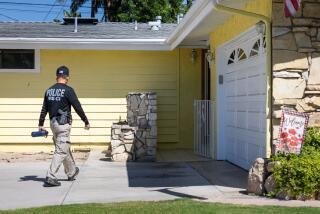Cash Source to O.C. Sheriff Is Ex-Con
The Newport Beach businessman who funneled thousands of dollars worth of investors’ cash into the 2002 reelection campaign of Orange County Sheriff Michael S. Carona is a convicted felon who spent 12 years in and out of California prisons on drug, robbery and other charges.
Charles H. Gabbard, an inventor who once ran for the Newport Beach City Council and has rubbed shoulders with the affluent coastal town’s elite, served several stretches in state prison from 1962 to 1974, according to California Corrections Department files. Many who knew him were unaware of his criminal history.
Corrections spokeswoman Margot Bach, who reviewed Gabbard’s file Friday, said he served time for convictions in Riverside, San Diego and other counties. The charges include grand theft, attempted robbery, possession of a controlled substance and parole violations.
Records also show he participated in an unsuccessful 1962 escape attempt, apparently from the California Institution for Men in Chino, Bach said.
Gabbard, 67, owns a Mission Viejo company that sought to market a laser device he invented that would allow police to safely shut off the engines of fleeing cars. The company has drawn public attention in recent days because of a public corruption investigation by the FBI into consulting fees the company paid to George Jaramillo, second in command of the Orange County Sheriff’s Department until he was fired last week.
Gabbard’s lawyer, John Gladych, said he would not allow his client to comment on his prison record but confirmed that Gabbard had told him he had served time.
Carona could not be reached for comment Friday, and Charles H. Bell, a Sacramento lawyer hired to represent the sheriff’s campaign committee in the escalating contribution scandal, said he did not know whether the sheriff was aware of Gabbard’s criminal history.
Meanwhile Friday, the sheriff faxed a letter to state Atty. Gen. Bill Lockyer asking him to investigate whether Gabbard and his company, CHG Safety Technologies, broke the law by steering investors’ money into Carona’s campaign, in some cases in exchange for stock in the company. Gladych said this week that Gabbard’s company contributed as many as 40 checks for $1,000 each to Carona’s campaign in this fashion, unaware that the practice could violate campaign-finance laws.
In his fax to Lockyer, Carona wrote that he found out about the donations through newspaper stories and pledged his full cooperation.
Questionable donations could be refunded or transferred to the state general fund, depending upon how the investigation unfolds, Bell said.
“It’s quite unusual. It’s a little bit different than a typical campaign money-laundering scheme, in which someone gives someone else a check or cash and asks them to make a campaign contribution,” Bell said. “Nonetheless, it raises questions about whether [money-laundering] is what was going on here. And I think that’s what investigators will need to determine.”
Lockyer spokesman Nathan Barankin said the attorney general would have to determine whether his office was the appropriate agency to handle such an investigation.
Revelations of Gabbard’s criminal past add another piece to a growing puzzle surrounding Jaramillo, a former Garden Grove police officer and lawyer who managed Carona’s first campaign in 1998 and was appointed second-in-command of the 4,200-member department shortly after his election.
Weeks after the Orange County Grand Jury opened an investigation into allegations that Jaramillo interfered in the investigation of crimes allegedly committed by the son of another assistant sheriff, Carona fired Jaramillo, citing a need for a management shakeup.
Then it emerged that Jaramillo and his wife had received a total of $25,000 in 2000 and 2001 as consultants helping Gabbard’s company win the endorsement of Carona and other top law enforcement officials. FBI investigators, who raided his office March 20, say they have opened a public corruption probe into the affair.
Though some who know him say they had an inkling of Gabbard’s criminal record, it evidently remained a secret when he ran for a City Council seat in Newport Beach. He emerged as a colorful, tough-talking candidate in a low-cost 1994 campaign that he ultimately lost.
“You need someone in there who’s meaner than a junkyard dog,” he told the Daily Pilot during his council campaign. “Well, I’m not afraid of anything that walks, crawls or breathes.”
During the council race, Gabbard was investigated by the Newport Beach police and Orange County district attorney’s office for perjury, an inquiry that stemmed from an allegation that he had listed his business -- not his Corona del Mar apartment -- as his principal residence on campaign disclosures. The investigation was dropped without charges being filed.
Gabbard, who was an active member of the Corona del Mar Chamber of Commerce at the time, said the mix-up over his residence was related to his divorce and his decision to live in his office. “The only thing I probably broke a law on is that I didn’t know you couldn’t live in a place like that,” he said.
Doug Stone, a spokesman for the California secretary of state, said that under state statutes, a convicted felon might be able to run for office -- it depends whether his felonies are among those listed in the government code. It also depends whether the position involves law enforcement and local ordinances that might restrict candidates from holding office.
More to Read
Sign up for Essential California
The most important California stories and recommendations in your inbox every morning.
You may occasionally receive promotional content from the Los Angeles Times.









